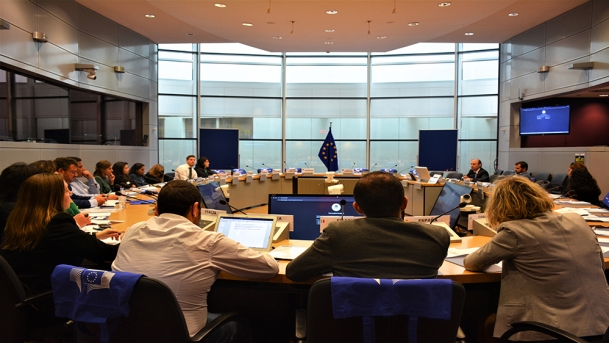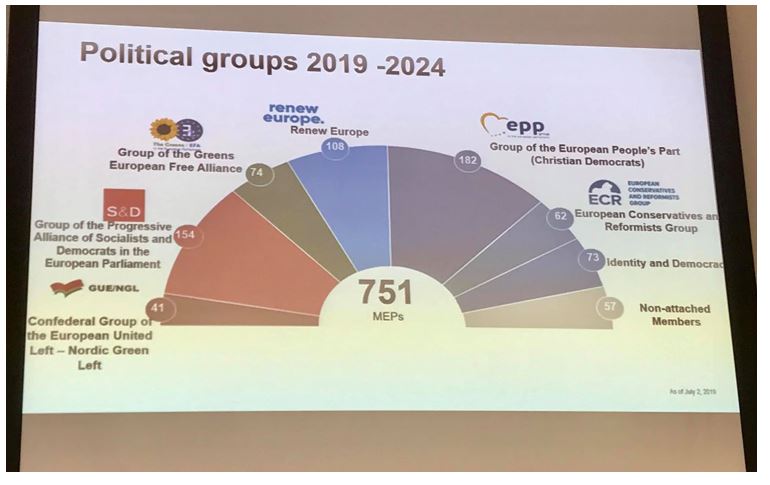
The Belgium-based College of Europe hosted the first workshop on Euro-Arab Relations in Bruges and Brussels between July 15 and July 19, 2019, with 24 participants both from the League of Arab States and the European Union and from civil society/think tanks/academia selected from a list of 300 candidates.
As an EU-funded project, the objective of the workshop entitled “El-Hiwar” was “to strengthen dialogue, cooperation and collaboration with key regional actors involved in Euro-Arab relations, through a number of activities including institutional training courses and policy dialogues.” It included lectures, dedicated workshops focusing on skills, panel/roundtable discussions, a study visit to EU institutions and many opportunities to expand the professional network among the participants.
In his presentation “Constructing a Euro-Arab Dialogue Discourse in the Public Sphere”, Dr. Mohammed Cherkaoui, senior fellow at Aljazeera Centre for Studies (AJCS), addressed the challenges and expectations of the Euro-Arab dialogue from a constructivist approach since individuals and societies derive their perceptions, positions, and worldviews from the media, both traditional and social media. He explained how “the media is a fluid field of competitive narratives, discourses, and political philosophies”, and pointed to the new dynamics of the Arab public sphere since the uprisings of 2011.
Cherkaoui also highlighted the emergence of popular skepticism and radicalized narratives across the norther states of the Mediterranean Sea, amidst growing populism, nationalism and right-wing politics in Italy, Hungary, Austria, and Spain. The recent European elections, held May 23-26, 2019, have solidified the new balance of power with growing numbers of nationalists in the European Parliament. He also pointed out the shift in Europe’s position from the advocacy of Arab democratization and empowering the Arab civil society (2011-2014) to a debate between the strategies of convergence/divergence in shaping the EU foreign policy towards the Arab states (2014-2019).
Cherkaoui also addressed the dilemma of extremism and political violence, prospects of moderate Euro-Islam, and the significance of second and third generations of Euro-Arabs/Muslims in reshaping identity politics, which raise new questions about alternative approaches and tools of change, especially in the year of the European Union elections, which represent more than 512 million people from 28 member states.
 |
| At the media gallery of the European Commission in Brussels [Al Jazeera] |
In his comments about the drivers of change in the Euro-Arab relations, Cherkaoui argued for a shift in the Euro-Arab peacebuilding discourse beyond its normativity and romanticized idealism into a pragmatic and result-oriented strategy. “These are two areas of promising engagement between European and Arab nations. However, they remain under-studied in the field of peacebuilding and mediation. First, empowering Arab and Euro-Arab civil society, as a promising agent of change, to help conceptualise innovative initiatives in both European and Arab public spheres, and ultimately push them, as new points of entry, into formulating public policies on both sides of the Mediterranean. Second, nurturing a fear-free Arab public sphere in the post-2011 Uprisings era, as various media outlets frame and reframe their narratives about complex current affairs throughout the open-ended daily cycle of news,” he stated.
Dr. Cherkaoui commented on the significance of the interconnectedness between civil society and the media in mobilizing bottom-up calls for change of perceptions, worldviews and strategies. His proposal aimed at developing an alternative paradigm where Euro-Arab civil societies and the media can serve as promoters of peacebuilding and cultural mediation.
 |
| New political groups in the European Parliament [Al Jazeera] |